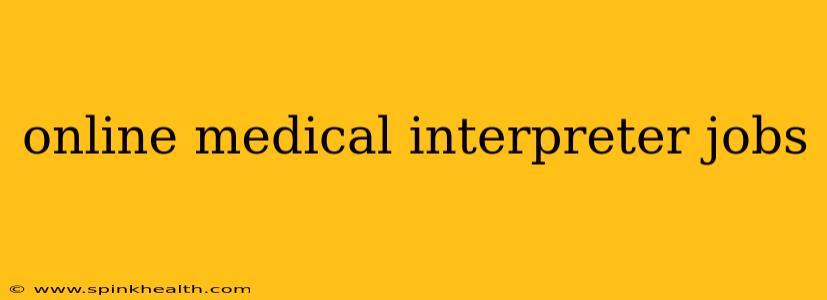The world is shrinking, and with it, the need for clear, accurate communication across languages is growing exponentially. This is especially true in the medical field, where a miscommunication can have life-altering consequences. Enter the online medical interpreter, a vital bridge connecting healthcare providers and patients who don't share a common language. But what exactly does this career entail, and how can you become part of this increasingly important profession? Let's dive in.
My name is Elena Ramirez, and I've been a medical interpreter for over ten years, both in-person and online. I've seen firsthand the impact accurate interpretation can have on patient care and overall health outcomes. In this post, I’ll share my experience and expertise to help guide you through the world of online medical interpreter jobs.
What Does an Online Medical Interpreter Do?
Online medical interpreters facilitate communication between healthcare professionals and patients who speak different languages. This involves more than just translating words; it's about accurately conveying the nuances of medical terminology, cultural sensitivities, and emotional context. Imagine a patient describing intense abdominal pain – an online interpreter needs to convey not just the pain itself, but its severity, location, and any accompanying symptoms with precision. This requires a deep understanding of both the source and target languages, as well as a strong grasp of medical vocabulary.
What are the Requirements for Online Medical Interpreter Jobs?
Becoming a successful online medical interpreter requires more than just fluency in two languages. While bilingualism is essential, several key skills and qualifications are crucial:
Language Proficiency: Native or near-native fluency in both languages is a must. This includes understanding complex medical terminology, idioms, and colloquialisms.
Medical Terminology: A strong grasp of medical vocabulary is paramount. You'll need to understand complex medical concepts and translate them accurately into the target language. This often requires ongoing study and professional development.
Technical Skills: Comfort with technology is vital. You'll be using video conferencing software, interpreting platforms, and potentially other digital tools.
Certification: While not always mandatory, certification demonstrates professionalism and competency. Several organizations offer medical interpreter certifications, providing credibility and validating your skills.
Professionalism & Ethics: Maintaining confidentiality, adhering to ethical guidelines, and exhibiting professionalism are paramount in this field. You’re handling sensitive personal information and need to act with utmost discretion.
What are the Different Types of Online Medical Interpreter Jobs?
The field offers a variety of options, catering to different preferences and schedules. You could work for:
Interpretation Agencies: Many agencies specialize in connecting medical professionals with interpreters. They often offer a variety of assignments, providing flexibility and potential for steady work.
Hospitals and Clinics: Some healthcare facilities employ their own online medical interpreters or contract with agencies to provide remote interpretation services.
Independent Contractors: You could also work independently, setting your own hours and rates, and marketing your services directly to clients. This option requires more self-promotion and business management skills.
How Much Do Online Medical Interpreters Make?
Earnings vary widely depending on experience, certifications, language pairs, and the type of employment. Independent contractors may set their own rates, while agency-employed interpreters typically receive a per-hour or per-assignment fee. The pay can be quite competitive, especially for those with in-demand language skills and specialized medical knowledge.
How Can I Become an Online Medical Interpreter?
The path to becoming a successful online medical interpreter typically involves:
Education & Training: Formal training in interpretation or translation, coupled with medical terminology courses, is highly beneficial.
Experience: Gaining experience through volunteer work, internships, or entry-level positions can significantly boost your resume.
Certification: Obtaining professional certification will enhance your credibility and marketability.
Networking: Building professional connections within the healthcare and interpreting communities is important for finding opportunities.
What are the Challenges of Being an Online Medical Interpreter?
While the career is rewarding, it comes with its own challenges:
Maintaining Confidentiality: The sensitive nature of medical information necessitates stringent confidentiality measures.
Technological Issues: Internet connectivity problems or software glitches can disrupt interpretation sessions.
Emotional Toll: Interpreting sensitive medical information can be emotionally demanding.
How Do I Find Online Medical Interpreter Jobs?
Numerous avenues exist for finding suitable positions, including job boards, agency websites, and direct outreach to healthcare facilities. Networking within the interpreting and healthcare communities is also a great strategy.
Working as an online medical interpreter is a rewarding career, allowing you to use your language skills to make a tangible difference in people's lives. With dedication, training, and perseverance, you can embark on a fulfilling journey in this vital field. Remember to always prioritize ethical conduct, continuous learning, and professional development to thrive in this dynamic career path.

